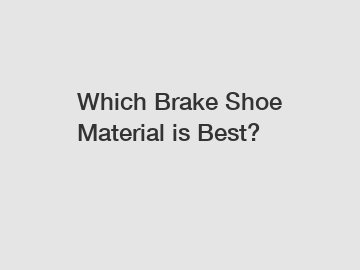Which Brake Shoe Material is Best?
Which Brake Shoe Material is Best?
When it comes to braking systems, one of the crucial components that often goes unnoticed is the brake shoe material. The material used in brake shoes plays a critical role in determining the overall braking performance of a vehicle. While there are several options available in the market, it is essential to understand which brake shoe material is the best for optimum safety and performance.
Brake shoes are primarily responsible for creating friction against the brake drum, thus enabling the vehicle to slow down or come to a complete stop. Different materials offer varying levels of performance in terms of durability, heat resistance, and braking efficiency. Let's explore some of the commonly used brake shoe materials and their respective advantages and disadvantages.

1. Organic Brake Shoe Material:
Organic brake shoe material, as the name suggests, is made from organic compounds such as rubber, resins, and fibers. This material is the most commonly used in passenger vehicles due to its ability to provide smooth and quiet braking. Organic brake shoes offer good initial bite, meaning they provide an immediate response when the brake pedal is pressed. Additionally, they generate less noise and dust compared to other materials. However, organic materials tend to wear out faster, especially under high-temperature conditions. They are not suitable for heavy-duty vehicles or vehicles that endure frequent braking.
2. Semi-Metallic Brake Shoe Material:
Semi-metallic brake shoe material consists of a blend of organic compounds and metal fibers. They offer an excellent balance between performance and durability, making them suitable for a wide range of vehicles. Semi-metallic brake shoes provide better heat dissipation, allowing them to withstand high temperatures without significant deterioration in performance. Moreover, they have a longer lifespan compared to organic materials. However, semi-metallic brake shoes tend to create more noise and dust particles during braking, which may be a drawback for some users.
3. Ceramic Brake Shoe Material:
Ceramic brake shoe material is known for its exceptional performance and durability. These brake shoes are constructed from a mixture of ceramic fibers, metal, and other composite materials. They provide superior braking power, especially under high-temperature conditions. Ceramic brake shoes are less prone to fading, meaning the braking performance remains consistent even after prolonged or aggressive use. Additionally, they generate minimal noise and dust. However, ceramic brake shoes are typically more expensive than other materials, making them less common in regular passenger vehicles.
In conclusion, the choice of brake shoe material depends on various factors, including the type of vehicle, driving conditions, and personal preferences. While organic brake shoe material offers smooth and quiet braking, semi-metallic materials provide a good balance between performance and durability. On the other hand, ceramic brake shoe material excels in high-performance applications but comes at a higher cost. Therefore, it is essential to consider these factors and consult with a professional to determine the best brake shoe material for your specific needs. Evaluating these options will ensure an optimal braking system that prioritizes safety, efficiency, and longevity.
If you are looking for more details, kindly visit ceramic vs metal brakes, brake pads manufacturers in china, FMSI D928 Brake Pads.
265
0
0

Comments
All Comments (0)